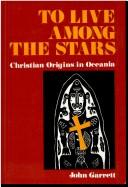| Listing 1 - 3 of 3 |
Sort by
|

ISBN: 2825406929 9782825406922 Year: 1982 Publisher: Geneva: WCC,
Abstract | Keywords | Export | Availability | Bookmark
 Loading...
Loading...Choose an application
- Reference Manager
- EndNote
- RefWorks (Direct export to RefWorks)
Christianity --- Oceania --- Church history --- Religions --- Oceanica --- South Pacific --- South Pacific Ocean Region --- South Pacific Region --- South Sea Islands --- South Seas --- Southwest Pacific Region --- Islands of the Pacific --- Church history. --- OceaniE [werelddeel] --- historiografie --- protestantisme --- katholicisme --- Moana Nui, Te --- Moana Oceania --- Te Moana Nui --- Christianity - Oceania --- Oceania - Church history
Book
ISBN: 1589839579 9781589839571 9781306582063 1306582067 9781589839557 1589839552 9781589839564 1589839560 Year: 2014 Volume: 75 Publisher: Atlanta: Society of biblical literature,
Abstract | Keywords | Export | Availability | Bookmark
 Loading...
Loading...Choose an application
- Reference Manager
- EndNote
- RefWorks (Direct export to RefWorks)
Christianity --- Christian life --- Christians --- Discipleship --- Religious life --- Theology, Practical --- Religions --- Church history --- Bible --- Criticism, interpretation, etc. --- Oceania --- Oceanica --- South Pacific --- South Pacific Ocean Region --- South Pacific Region --- South Sea Islands --- South Seas --- Southwest Pacific Region --- Islands of the Pacific --- Social conditions. --- Environmental conditions. --- Moana Nui, Te --- Moana Oceania --- Te Moana Nui --- Christianity - Oceania. --- Christian life - Oceania. --- Oceania - Social conditions. --- Oceania - Environmental conditions.
Book
ISBN: 1501711016 1501710990 1501711024 1501711008 Year: 2018 Publisher: Ithaca : Cornell University Press,
Abstract | Keywords | Export | Availability | Bookmark
 Loading...
Loading...Choose an application
- Reference Manager
- EndNote
- RefWorks (Direct export to RefWorks)
Ryan Schram explores the experiences of living in intercultural and historical conjunctures among Auhelawa people of Papua New Guinea in Harvests, Feasts, and Graves. In this ethnographic investigation, Schram ponders how Auhelawa question the meaning of social forms and through this questioning seek paths to establish a new sense of their collective self.Harvests, Feasts, and Graves describes the ways in which Auhelawa people, and by extension many others, produce knowledge of themselves as historical subjects in the aftermath of diverse and incomplete encounters with Christianity, capitalism, and Western values. Using the contemporary setting of Papua New Guinea, Schram presents a new take on essential topics and foundational questions of social and cultural anthropology.If, as Marx writes, "the tradition of all dead generations weighs like a nightmare on the brains of the living," Harvests, Feasts, and Graves asks: Which history weighs the most? And how does the weight of history become salient as a ground for subjective consciousness? Taking cues from postcolonial theory and indigenous studies, Schram rethinks the "ontological turn" in anthropology and develops a new way to think about the nature of historical consciousness.Rather than seeing the present as either tragedy or farce, Schram argues that contemporary historical consciousness is produced through reflexive sociality. Like all societies, Auhelawa is located in an intercultural conjuncture, yet their contemporary life is not a story of worlds colliding, but a shattered mirror in which multiple Auhelawa subjectivities are possible.
Postcolonialism --- Social change --- Ethnology --- Cultural anthropology --- Ethnography --- Races of man --- Social anthropology --- Anthropology --- Human beings --- Change, Social --- Cultural change --- Cultural transformation --- Societal change --- Socio-cultural change --- Social history --- Social evolution --- Post-colonialism --- Postcolonial theory --- Political science --- Decolonization --- Milne Bay Province (Papua New Guinea) --- Social life and customs. --- postcolonial consciousness, Christianity, Oceania, cultural change.
| Listing 1 - 3 of 3 |
Sort by
|

 Search
Search Feedback
Feedback About UniCat
About UniCat  Help
Help News
News